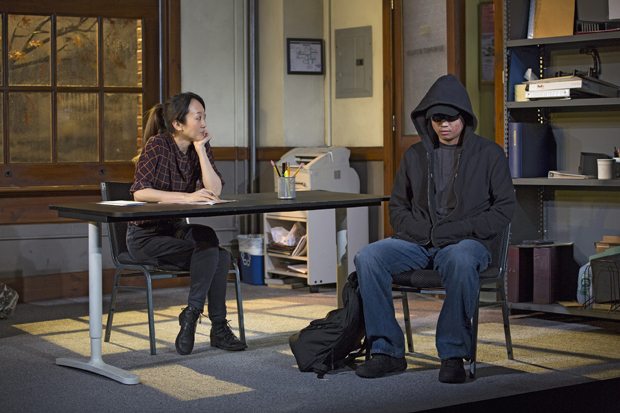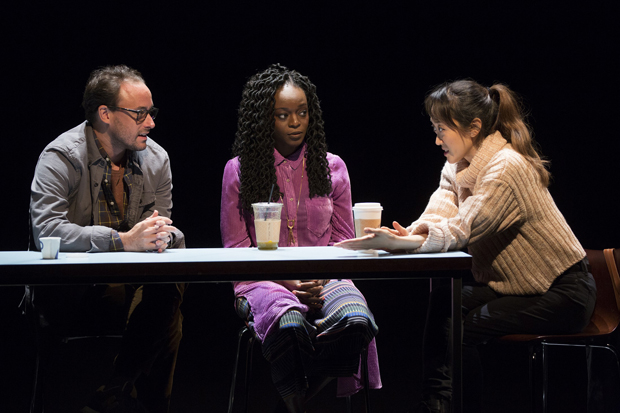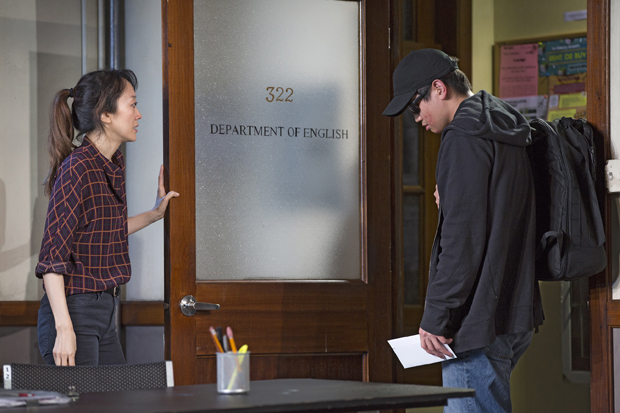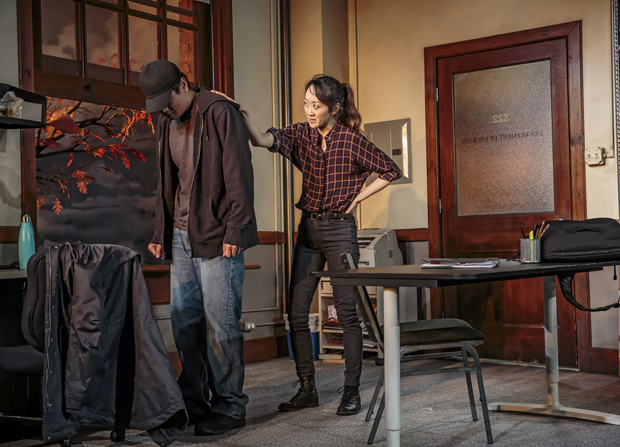Office Hour

(© Carol Rosegg)
A mere week after the deadliest terrorist attack in New York since 9/11, you may be reluctant to sit through a play in which guns are repeatedly pointed toward the audience. And really, the ubiquity of angry individuals with access to deadly weapons ensures that there will never be a comfortable time to see Julia Cho's Office Hour. It will always be just a few days since the latest mass killing. Nowhere feels safe, not even the Public Theater, where this disturbing yet occasionally dull new play is having its New York debut.
It opens in a coffee shop just outside the university where Gina (Sue Jean Kim) teaches as an adjunct writing professor. Fellow adjuncts David (a disparaging Greg Keller) and Genevieve (a nonspecifically sympathetic Adeola Role) have invited Gina here to warn her about a problem student who has just enrolled in her class. Dennis (Ki Hong Lee) has no friends and barely ever speaks, but when he writes, he unleashes a torrent of perverse depictions of violence and sex. Other students drop classes just to avoid him. "He's a classic shooter," David warns.

(© Carol Rosegg)
Rather than advising her to quit her job and run, they think Gina should get to know Dennis during office hours, if only to gather enough information about him to let someone in his family know that he needs psychiatric help. "You guys must have stuff in common," Genevieve posits, "not psychologically but, you know, a background." Gina and Dennis are Asian-Americans. While that shared identity ostensibly makes Gina the best candidate to crack Dennis's exoskeleton, we know better: She's the best woman for the job because, inexplicably, she gives a damn.
Not in spite, but because of her wobbly knees and shaky voice, Kim gives a courageous performance as Gina. And there's no denying that Dennis is scary: Lee plays him with a disquieting silence, his head bowed and sheathed in sunglasses, a baseball cap, and a hoodie (iconic costume design by Kaye Voyce). When he does speak, he is difficult to follow as he jumps between delusions of grandeur and martyrdom. We attempt to peer into his deep well of rage, but cannot see the bottom. He is a lone wolf, the humiliated man we have come to revile and fear.

(© Carol Rosegg)
We spend most of the play watching these two characters trapped in what appears to be an academic cage: Takeshi Kata's unit set, depicting the office Gina shares with several other adjuncts, lurches out of the darkness like a particularly depressing MMA ring. Suspecting what danger Gina is in, we cannot look away.
Cho indulges our grim curiosity by allowing the worst possible scenarios to play out, only to quickly erase her choice by jumping back in time with a blackout. It's a convention that's been used before, but it feels a lot less gimmicky here (director Neel Keller's unflashy staging certainly has something to do with that). One wonders if the influence of video games has led not to an increase in gun violence, but a desire to reset reality.
The actual path Cho charts is less sensational than the roads less traveled: Somewhat disappointingly, Office Hour begins to resemble a therapy session in which both the doctor and patient have suffered under disapproving immigrant parents. Everyone onstage has a good cry and we tear up a bit from sheer boredom. It feels like an easy way out of a much harder story.
We are briefly jolted to attention by a sequence of rapid-fire scenes imagining all the horrible ways a shooting could happen on this campus. Christopher Akerlind's treacherous lighting flashes and disappears, creating brief glimmers of horror and even scarier periods of darkness. Sound designer Bray Poor fills the room with gunshots that seem to be coming from all directions. We initially resent this reminder that living in America in 2017 means being constantly surrounded by psychotics with access to military grade firearms.

(© Carol Rosegg)
Then something incredible happens: We get used to it. It stops being upsetting and starts to become expected, much as weekly mass killings have become predictable in this country. Whether by design or not, our reaction to what should be a traumatizing scene is the most disturbing revelation of the play.










